Business
The Forum has new owners, a new rezoning applicant for multi-use [Podcast]
Published
2 years agoon
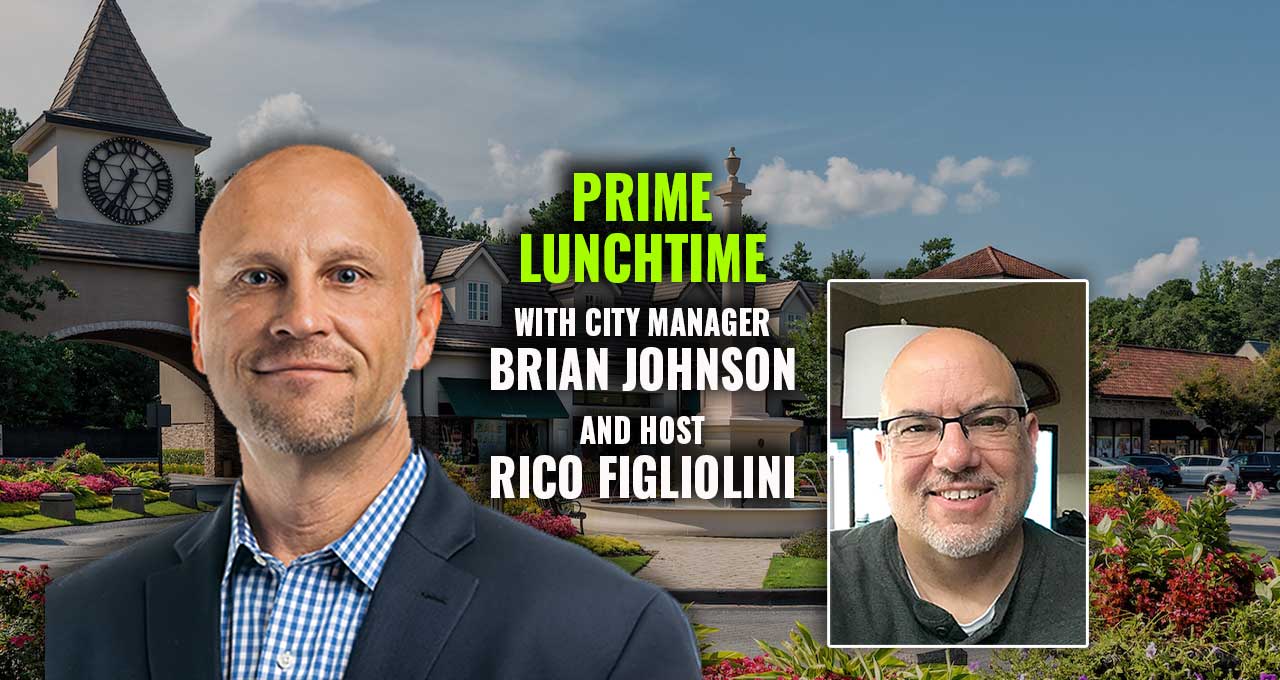
This episode talks about The Forum on Peachtree Parkway being sold to North American Properties, an upcoming rezoning request for multi-use along Peachtree Parkway, a town center playground update, and more. Join your host Rico Figliolini and guest City Manager Brian Johnson on Prime Lunchtime with the City Manager.
Timestamp:
[00:00:30] – Intro
[00:01:35] – Purchase of the Forum
[00:07:19] – The Push for Residential
[00:14:56] – How Peachtree Corners is Growing
[00:18:13] – Israeli Consul General Visiting
[00:20:20] – New Playground Updates
[00:26:58] – Closing
“We know that the Forum’s a critical part, and its success is the City’s success. It helps generate a lot of revenue that we in turn can use to provide services back to our stakeholders. Whether it be streets or multi-use paths, or even keeping a zero millage rate. And we are excited about working with the North American Properties, trying to take the property and take it to the next level. And so we’re rolling up our sleeves, getting ready to get that started.”
Brian johnson
[00:00:30] Rico: Hi everyone. This is Rico Figliolini, host of Peachtree Corners Life and today’s Prime Lunchtime with the City Manager. Hey, Brian, how are you?
[00:00:38] Brian: Rico, good. How are you?
[00:00:40] Rico: Great. It’s good to have you on. This particular episode, we’re going to be talking a little bit about the new purchase that’s finally closed this past Friday, with the Forum of Peachtree Parkway. And Brian’s going to help us out with some detail on that. The new owners, North American Properties has taken it over. They are a company that is well-known for working with Avalon and Atlantic Station. They run and own those areas as well as others. So they found, obviously, an opportunity here that they believe they can take and invest in and actually grow the Forum into a great product. And a great place for us, a great space for us to live in, if you will. So we’re going to talk a little bit about that and a little bit about progress on the playground that’s going on, being built across the way at Town Center. And just a couple of other things, but let’s start off with the Forum purchase. Bryan, why don’t you tell us a little bit about what’s going on there now? What’s the latest?
[00:01:35] Brian: Well, like you said, North American Properties closed on the property on this past Friday. Their interest in the Forum is kind of in line with what they’ve done at some other properties of late. Instead of being involved in brand new mixed use developments, they’ve liked to find properties that are maybe in great areas. And ones that, maybe they feel like from an ownership and management company, they can improve the property a little bit by investing in it and then operating it instead of spinning it off to have somebody else operate it. And so they’ve done that in a couple locations already and they think that the Forum is right for that. Not only are they excited about the community that is around the Forum, the traffic count that’s near the Forum, the history and the name that it has, but it has good bones. And they also like the fact that the city understands the importance of it. It is essentially one half of what is our downtown now. And when you have a municipality who’s invested in a property within its corporate limits, then developers like that, because that means that we’re more inclined to do what it takes to ensure that this thing is a success. And we know that the Forum’s a critical part and its success is the City’s success. It helps generate a lot of revenue that we in turn can use to provide services back to our stakeholders. Whether it be streets or multi-use paths, or even keeping a zero millage rate. And we are excited about working with the North American Properties, trying to take the property and take it to the next level. And so we’re rolling up our sleeves, getting ready to get that started.
[00:03:26] Rico: Cool. We’ve been talking about this for a while now, obviously. We’re hoping that new owners would take it over because they’re reep running it. And having a secondary company managing it, it’s not quite the same as having an owner manager. And so part of what we talked about also is that a place like this could have some density. Being worked on as far as adding density to it. So, maybe we can talk a little bit about that as far as, what the City’s willing to do there. We talked a little bit, I think at one point, about a parking deck and such. Being a part of it and allowing for a space for other things to happen, for green space and stuff.
[00:04:04] Brian: Well, what you’re referring to, I can kind of go back to the previous owner if you will. And that is, the previous owner, when they reached out to the city to notify us that they were putting the Forum on the market, the reason that they were doing so as articulated to us was the fact that the Forum was a property that joined a number of other properties that they were selling that had a common theme. And they were unloading all of their properties that did not have onsite residential or onsite public gathering space. And so the Forum had neither of those or has neither of those. So the previous owner put it up along with other properties that met that description in their portfolio, they put them up for sale. North American Properties has articulated to us that one of the things they want to do and they are in a position to do because they are not only the owners, but they are going to operate it as well, which is oftentimes not the case. Many times the owners don’t operate it they merely contract with a property management company. And then that company manages it and manages the leases and operates it.
[00:05:22] Rico: Right.
[00:05:22] Brian: North American’s going to do both, which was very exciting to the city because we knew that North American Properties would invest in the property in a way that maybe results in temporarily lease revenue to be negatively impacted due to construction or other things. But they were okay with doing it because they were going to operate it as well. So they have expressed an interest in installing, if you will, onsite residential and onsite greenspace. So the city will obviously have to be to some degree or other involved in both. We do know that if there is greenspace, that’s going to have to be added and the only place to add it on the Forum property is by removing parking spaces. So the city may end up having to be involved in that to help them be able to construct green space because that means parking is going to have to be moved elsewhere, so that may involve structured parking. Maybe not too dissimilar to what we did with the Town Center and Fuqua which was the partner over there. So that may end up being part of this and then obviously residential onsite, it’s going to have to have some rezoning component. The details of that have not been presented or discussed or considered. So I don’t honestly know any more than that. They are interested in putting onsite residential in some capacity on the property. And all the evidence to healthy, mixed use developments such as the Forum, all point to needing onsite residential, and public gathering space, part of the ingredients for successful mixed use development. So it’s not surprising to us. You know, again, the devil’s in the details and that’s why our sleeves are rolled up and ready to dig in.
[00:07:19] Rico: And I understand you guys are probably meeting as we speak, you’ll be meeting sometime this week, I think on this. And I guess I can speculate a little bit from my own end that residential is probably, certainly a strong component of what’s going to happen there over the next 18 months or so. Because it needs it right? Like any multi-use. And if we look at the past history of what they’ve done, Atlantic Station, Avalon and such, residential is a big component of that. So certainly I think I can imagine that there could be probably north of 150 to 200 units coming right there at the Forum in some capacity, in some area that they set up there. Which, live, work, and play. I mean, you could be working there, living and certainly at Technology Park and I think as one company put it, we are a 15 minute city. And in their eyes because of where they located, you could walk anywhere in 15 minutes and get what you need. Which is an interesting description of what we are, being a 15 minute city that way. Because our downtown area, anywhere within this area, whether you’d be, let’s say Spalding Drive near Intuitive Robotics, or if you’re at City Hall, maybe. 15 minute walk will get you to shopping to food, to entertainment, to a degree. So interesting concept in being a 15 minute city, that’s not Atlanta. That’s outside Atlanta. So kind of interesting. Plus we have that residential property across the way still that was rezoned apartment. Was what’s called the Old Roberts property, and that was sunset. So that became, that reverted back to its original rezoning which was not residential. But there’s another component and people are looking there and I wouldn’t be surprised if North American properties is looking at that property as well. That would have been about 260 odd units, plus a hotel with a hundred plus rooms.
[00:09:13] Brian: Well Rico, I mean, not only that parcel, which is again right there by Lazy Dog behind the old Black Walnut, and Georgia Clinic right there. There’s still, even some other parcels that are kind of right near there. And really, to be honest with you anywhere in the city. Especially the north of say Jimmy Carter, Holcomb Bridge. Really north of the split here. We’re under an immense amount of pressure from developers wanting to build residential units. And I say that, by saying in general, we are. Meaning all different types. But right now, based on a number of factors, whether it’s financing or interest demand, they tend to be heavy on the rental versus the equity component. And usually that’s because we are getting pretty close to not having a lot of undeveloped parcels left. Which means that as we grow, we’re going to have to grow up. Up as in vertical. And when you do that, generally that is much harder to finance when it’s equity, which we typically call a condo. And condos require about 50% or more of the units to be pre-sold before you can get the financing. And so it makes it harder on developers, so they’re less interested. But that puts pressure on the city of trying to make sure that we’re thinking through growth. And right now there’s a lot of discussions about how are we managing it. Because with virtual workplace now, a lot of people can go back to the suburbs, if you will. You can work at a company that’s located in Midtown, but if they’re maybe in the future, not going to make you come in at all, or maybe only one or two days a week. People are like, you know what? I can handle an hour commute each way if I only have to do it one or two day a week. But the rest of my time I can be out farther away from Midtown, get more house, more yard, for my money. And so there’s a resurgence of people interested in coming here. In addition to just Metro Atlanta growing and the housing market being like ridiculous right now. So there’s a lot of chain and we got a lot of challenges right now.
[00:11:37] Rico: Yeah. Especially like you mentioned, the housing stock is unbelievable. Because I mean, I see it every day. I mean, in our neighborhood, a house went up for sale. Within three weeks it was bought and it was bought at a premium above what they were asking of like 10 to 20,000. Just one family home on a slab, right? No basement or anything. It’s just, it does not stay in the market long in this area. So you’re right. I mean, I could see the pressure because we have another multi-use or M1 that wants to become a multi-use development that is applying, that went through the planning commission. That’s presented itself in front of City Council, it’s been tabled to June. And that is about 315 units that they would like to develop, plus a five story hotel. And on top of that, it’s on Peachtree Parkway, also. So not too far from another one that was recently approved and across from Corner Find One, I think is where it is. So yeah, I can see the pressure coming in doing that.
[00:12:36] Brian: But you know, it is important to note though that mayor and council understands that and they’re being much more comprehensive and methodical in their thinking about it then they’ve ever been forced to do. So, I want everybody to know that they’re not taking it lightly. There are some very comprehensive conversations going on right now, amongst them on essentially. What do they with this big, with this pressure, what do they want Peachtree Corners to look like when it grows up? Meaning we are sitting here in a location that you could probably represent is at a place where people who are moving to Atlanta and there are more people moving here than moving away. We’re growing as a region. So as those who choose to drive north out of say the airport, and they’re looking at places to put down roots, we’re getting many of them here. The question for council is going to be, do we end up as they’re driving into our city, are we here at the city limits saying, hey, before you decide to keep going north or whatever direction they leave in. Hey, let us spend some time telling you what a great community we are. Because we want you to stay here or are we saying, keep on going. Keep on going, if you’re wanting to go north to the further suburbs, keep on going. And if that’s the case, you know, they’re the ones who decide policy. That’s fine, but they’re kind of going through that right now. And if it is no, no, no, no, we want them to stay, then how is it we grow? Because we don’t have a lot of out. We’re not like a Forsyth county or one that has a lot of outward growth. So that’s what they’re having to kind of determine right now. And it’s a new normal that we’ve never seen, the rate of growth and the pressure on residential development is something we’ve never seen. So it’s ongoing, it’s comprehensive. And, I think we’re in a good position that it will come out of this very shortly in having a good course of action going forward.
[00:14:56] Rico: I’m sure there will be. I’ve had some conversations with one to two city council member and we’ve had conversations about this as well. What does it mean? Yes, do we want to have the ability to have more residents here, versus them going past us and we just become a through place. But also what does it mean to be a smart city? And what does it mean to allow multiuse development to be able to set standards in the type of developments that come to the city, whether it’s LEED buildings or EV charging stations, what does that mean? How, what is the philosophy of doing that? Because eventually if we’re talking about being a smart city, we certainly want to make sure that, in my mind, that we’re walking the walk and that we’re looking at urban development in the right way. And not just the proving something that’s going to have a restaurant and maybe one other shop and we call it a multi-use. So, I think that they, hopefully they have that conversation. They look at that a little better about what it means to be here. I mean, we just recently had, for example, the Israeli council general visit us. The Mayor, Mike Mason is on a mayor’s summit, remote, that’s part of the smart city conference in Taiwan. And we’re getting a lot of companies here, like Intuitive Robotics and other firms that are coming because we’re part of that Silicon Orchard, right? So I mean, if we can continue to look at our environment as a good steward, then we have to look at that too, right? How are we going to let these builders develop and in a smart way all around, right?
[00:16:34] Brian: You know, I mean I couldn’t have said it better myself, Rico. And that is exactly what council’s doing. In fact, at the council meeting Tuesday, the one policy or the one action item that council was involved in is they did change the pro-rata makeup of a mixed use development by requiring a higher percentage of non-residential uses on a mixed use parcel. To prevent somebody coming in and having three uses, 95% of it’s residential, 3% something else, and then 2% the remaining. And, they’re like, that’s ridiculous. So, yes. I mean, you know, maybe even more to follow on that. But there’s definitely those conversations about all right, what are we going to do to set ourselves apart from others? What are we going to do to continue to live up to the reputation that we’re gaining? I mean, you know, the mayor was asked to speak and he was actually invited to speak in person there, did not work out for lots of different reasons COVID included. But invited to speak there, but on a panel of cities in the world of mayors, from cities like, well, Denver and Atlanta in the US. Or Prague, Czech Republic or Edmonton, Canada, Taipei, Taiwan. I mean, these are cities that are you know, way above our weight class. We were asked to speak at it because of the things that we’re doing. And so, yes, we need that to try to correspond into other conventional development within the city. Not just within the technology ecosystem.
[00:18:13] Rico: To stay on that for a little bit, so the Israeli Consul General did visit us. We have several, I think Israeli firms working out of here as well at Curiosity Lab and stuff. Anything new that you want to share with what’s going on there? I know there’s quite a bit, but if we can get a quick description of what’s going on, that would be great.
[00:18:32] Brian: The Israeli Consul General came up here because we do have a special relationship with really the nation of Israel, as well as Israeli companies. We have a number of arrangements and collaborations with governmental agencies within Israel. And a lot of Israeli companies come here because if you think about it, the nation of Israel is by population standpoint about the size of Metro Atlanta. And so if there is something that some product or software or whatever that’s invented there, for them to scale it they have to leave that area because that area is not really big enough for them to really scale. So they need to go to Asia or Europe or North America. And we are a location that a lot of them have started to find even more appealing than your typical, oh, I go to the states and I go to Silicon Valley or I go to research Triangle or I go to New York City. I mean, those are all great, but you are a small fish in a very big, expensive pond. Here you can actually be a smaller pond, it’s not as expensive. And just being the same size, you can be a bigger in relation to others because that pond doesn’t have so many big fish. And so we’re seeing a lot of it. The local Israeli consulate wanted to ensure that we continue to have that synergy between us and them. And we have great relationships with them. We’ll continue to, and we look forward to fostering that relationship. And getting more companies come through here and use Peachtree Corners either as a place to put down roots or as a launching pad. But we at least benefit from their involvement, however brief it may be.
[00:20:20] Rico: Yeah. So many companies out there that, so much representation from around the world here that we’re going to be doing another feature piece. Not in this coming issue, but the next about the amount of, the different companies we have that represent different countries here, that are based in Peachtree Corners. That’s, I think there’s over 20 nations that are actually represented. So that’d be a neat piece to talk about. Let’s get some update on the playground. That’s, I say playground, but it’s a little bit more involved than that. That’s being built out at Town Center. Dirt’s moving, everything’s moving around there. Are we still on track for that to come in for May? I think it was May, end of May?
[00:20:56] Brian: Yeah, we’re still on track around the end of May for most of the playground equipment. The supply chain issue is such that we may not have all the shade structures in for even as much as two months after that, unfortunately. Because you know we put seating around there as part of this because we knew parents were going to go over there and want to be close to their kids and everything. And so we may not have all of the shade structures in. Just again, supply chain and you just run out of it. But we’re still tracking on that. And so that’s good. You know, our goal was to have it in so that the first concert of our series, which is the end of May, doesn’t still have that area to be a construction site. We’re also, you know, I don’t know if you’ve been out there, we added a lot more decking under the current shade structures that are there on the other side of the town green. And we’re going to add another shade structure as well there. So there’s a lot more space for people to have furniture and we have a new fire pit out there that’s a little bit more user friendly. Although I will say Rico, unfortunately we may end up having to talk about this again, but we have created a really cool place to hang out. And it’s getting cooler by the day. You know, it’s just a great place to whether to get something, you know, and eat or drink, or a kid’s play or just hang out. But as a result of it, we’ve got a lot of destructive behavior that’s happening out there. And we’re getting ready to add over 80 cameras out into the parking deck and the Town Green area. And we’re having to do that, one, it’s a good deterrent. But two, just a lot of people going in and destroying things randomly for no reason. And it’s sad. I mean, we have a new much larger fire pit that had a lot of other, not only bigger, it was round. It was, you know, a place you kind of hang out. And yet all we do is it’s only been operational for probably two weeks and have already had people pry open the door to try to get to the controls. They’ve been stealing the stones. The nice stones that are in there. I mean just stuff like that. And it’s sad and, you know, we’re hoping. We may have to talk to the community as a whole and say, look, please help police yourselves and prevent a great location and amenity that’s theirs. It’s the community’s, it’s the public’s. But it’s either lack of parental supervision or people just, I mean, I don’t know. It’s sad.
[00:23:41] Rico: It’s probably happening in the middle of the night too, right? Like two or three in the morning and stuff.
[00:23:46] Brian: Some of it, but then some of it it’s not. I mean, we’ve had destructive behavior there and you know, again, even some of it’s on surveillance. But either we don’t have a great image of the person or what is generally the case is, you have video of a person. But unless like one of us recognized that person, there’s no way for us to know who it is.
[00:24:11] Rico: It’s amazing. Can’t keep anything in the public realm without having to deal with that crap, quite frankly. I just like, you know, you would imagine that people are a little bit more respectful, but no. It’s never going to be, and that’s never going to be the case because there are people that are just not respectful of things.
[00:24:30] Brian: I’ll even go so far as this, you know, with the playground areas, we’re doing site work. We’re doing grading and getting the terrain ready for when we bring in the artificial surfaces and everything. And so they will have construction equipment out there, like backhoes and mini excavators inside of areas roped off with caution tape. But on the weekend, you’ll go out there and people have ripped down or are inside of the caution tape, kids climbing around construction equipment and their parents are right there. But they’re letting them, we caught kids in the boom of the, you know, the back climbing around on that. And their parents are right there, like.
[00:25:12] Rico: And not for anything we don’t teach, I shouldn’t say we. But a lot of people just don’t teach their kids what respect means and things. And they’re, they’re all John Waynes and Yahoos sometimes saying, leave them alone, they need to play. And it’s just like, and then there are those people that want safe places for their kids. It’s just like, if we just taught a little respect, common respect and courtesy, that’s all we need. It’s just, it’ll never end this, like. And I’m not surprised quite frankly, because tape’s not going to hold anyone away, it’s just like.
[00:25:50] Brian: No, you’re like really? Can you not see them? And you’re underneath. You had to go underneath caution tape. Or it was ripped down, it’s laying on the ground, you’re stepping over, you know it’s a construction site and yet you’re either in there yourself or you’re letting your kid run around around that. And you’re just like, you know.
[00:26:08] Rico: And that same parent, God forbid a child gets hurt. The same people will want to sue the city to say that wasn’t enough. You shouldn’t have put just the tape there. You should have like put a cement wall to stop people from entering. It’s just like, you know what? At some point people have to take responsibility for themselves and their family.
[00:26:28] Brian: Yeah. But I guess the good thing here is that Town Center is doing what we, we hope, which is attracting people. And that’s, you know, activity begets more activity and makes restaurants and stores and everything healthier. So that’s good. But we just need to, those of us who live and work and use that need to police ourselves and make sure that we keep it a nice amenity and not let it get beat down by destructive, irresponsible people.
[00:26:58] Rico: Yeah. Amazing, never-ending. Well, I’m glad that we were able to talk about these things and especially about North American Properties and the Forum and that buyout. I know that there’ll be more coming out and actually my editor right now is going to be interviewing the owner of NAP by, I think 4:30 late today. So we’ll have an article out sometime in the next few days about that, a little bit more in depth hopefully some more information that we can provide people with. And we’re going to stay on top of this. That, along with everything else that’s going on in the city.
[00:27:28] Brian: It’s a big deal. It’s a big deal.
[00:27:31] Rico: For sure. So I appreciate your time, Brian. Thank you for being with us again. I look forward to next time. Share this with your friends, if you’re listening to the podcast on Apple or iHeart Radio, certainly leave a review on this. Look for more additional information on LivingInPeachtreeCorners.com. You can either subscribe to our newsletter to find out more news that comes out. We come out once or twice a week, depending on what news is going on. Or like us on Facebook, @PeachtreeCornersLife or follow us on Instagram as well. Thank you for being with us and we’ll see you next time.
Related
Business
The Forum Gives Sneak Peek of New Eateries and Community Spaces
Published
2 days agoon
July 24, 2024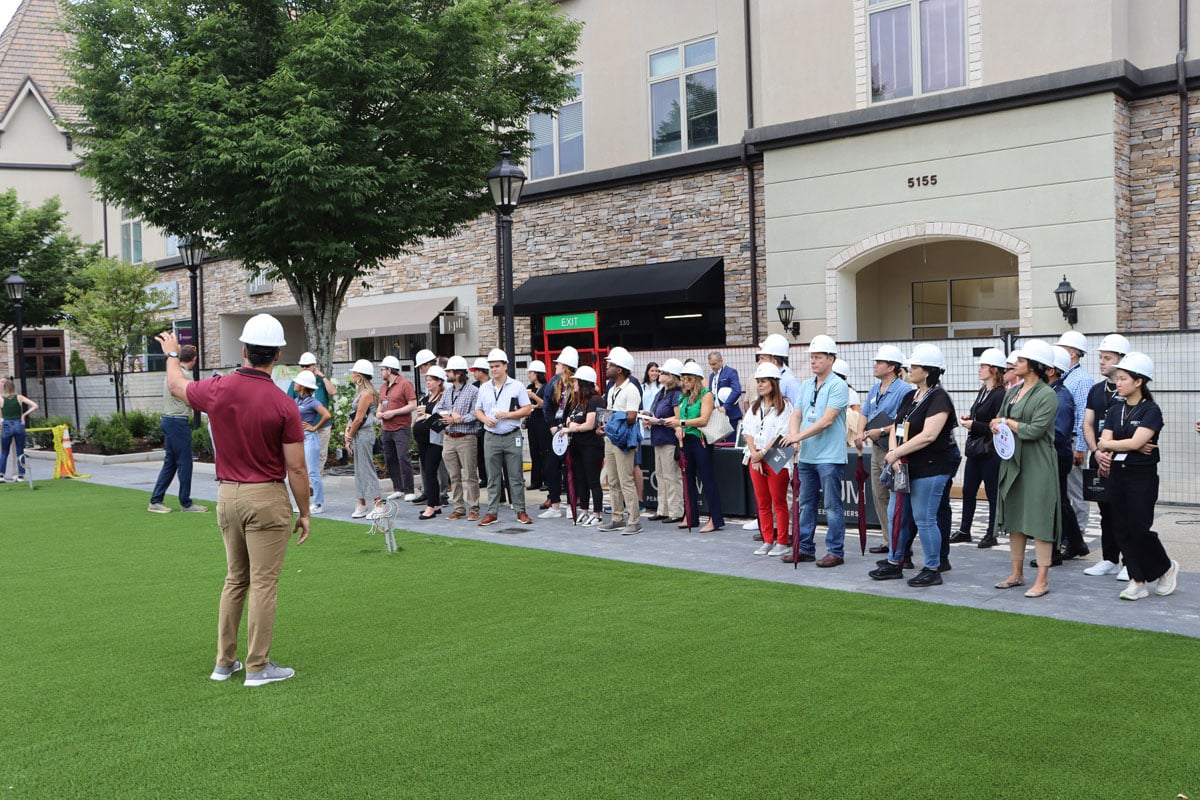
If you’ve been to or near the Forum in the past few months, you’ve probably noticed cranes and construction crews. The anticipation of the first phase of renovation of the 22-year-old retail center has left a lot of Peachtree Corners residents as well as nearby patrons excited to see changes.
The Forum administration invited the media for a hard hat tour on July 17. The event showcased the redevelopment progress ahead of The Plaza’s grand opening on Aug. 8.
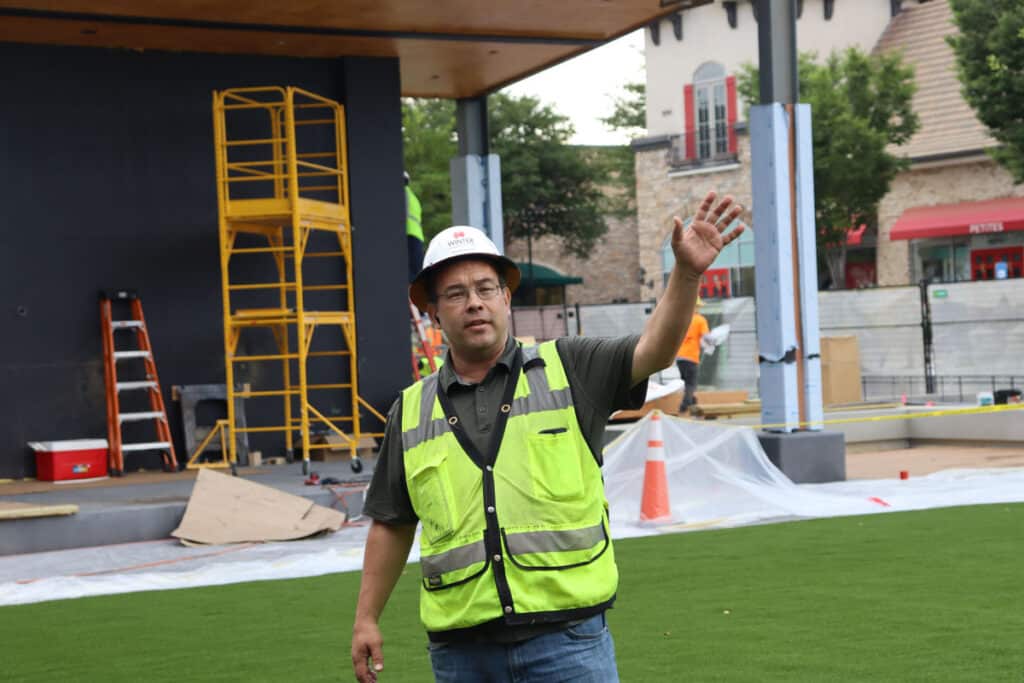
Scrumptious bites incoming
Executives from the development and leasing teams joined on-site management and led attendees around the new central gathering space, guest amenities and Politan Row, the newly created 10,000-square-foot food hall.
Dining concepts from veterans at Sheesh, Twenty-Six Thai and newbie Gekko Kitchen were the first food vendors announced for the space, which is expected to open in January.
“We can’t wait to introduce the Peachtree Corners community to our food hall experience,” said Politan Group CEO Will Donaldson in a news release. “Every detail from the design to the bar program to the cuisine is thoughtfully curated to inspire guests to not only mingle with one another but to connect with our incredible restaurateurs and discover new favorites.”
During the tour, Donaldson explained that eventually there will be seven different global cuisines in the Politan Row food court at the Forum featuring well-known and up-and-coming local talent. Once complete there will be a central bar, a private event venue and a covered outdoor patio.
“One of the things that we’re excited about is this unique design that we’ve come up with, that’s very specific to this area,” he said. “We’ll be open seven days a week for lunch and dinner. Whether you’re with a group for lunch or with your family, it works great for multiple settings.”
Twenty-six Thai owner Niki Pattharakositkul said the restaurant will work with local vendors to source the freshest meats and produce possible.
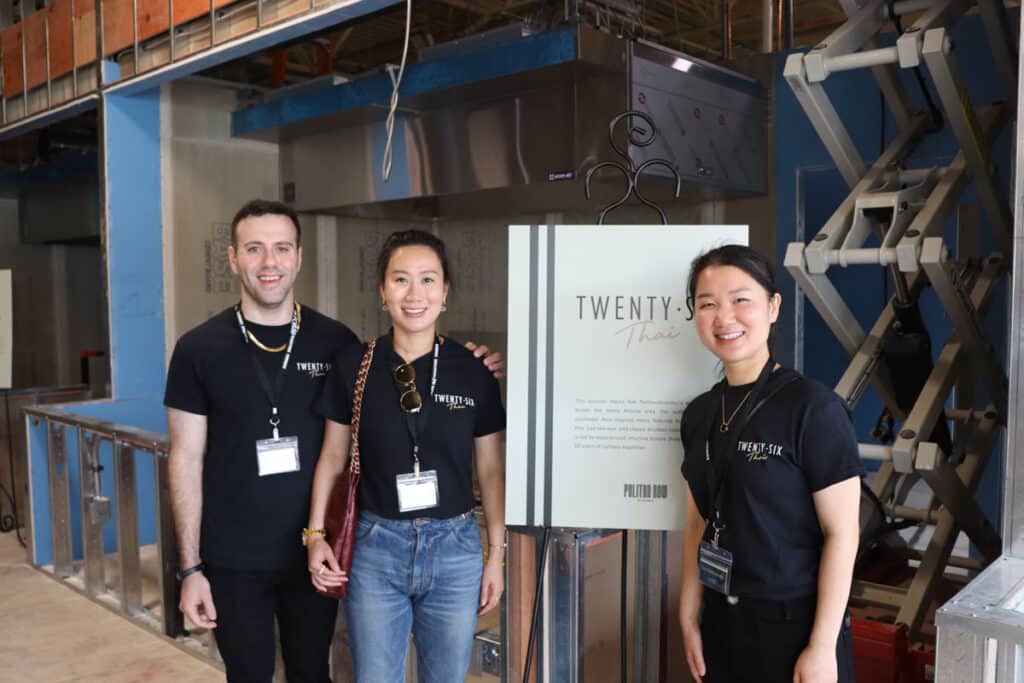
“There are certain types of produce and protein we try to source locally, but sauces and the more exotic produce and herbs, we have to import from Thailand,” she said. “Our brand is trying to move towards doing things locally and sustainably.”
Working with organizations such as Georgia Grown limits the use of large food distribution companies. Since starting Twenty-six Thai in 2016, Pattharakositkul has launched seven locations across metro Atlanta, including at Politan Row’s Ashford Lane and Colony Square.
The eatery describes itself as an “authentic wok-fired Southeast Asia-inspired menu featuring items such as pad Thai, pad see ewe and classic drunken noodles.”
Sheesh, a Mediterranean concept that uses simple, wholesome ingredients prepared with unique spices and blends, is run by corporate executive chef Charlie Sunyapong and director of operations Raquel Stalcup. The two are also members of the group behind full-service restaurants Stäge at Town Center and Pêche at the Forum.
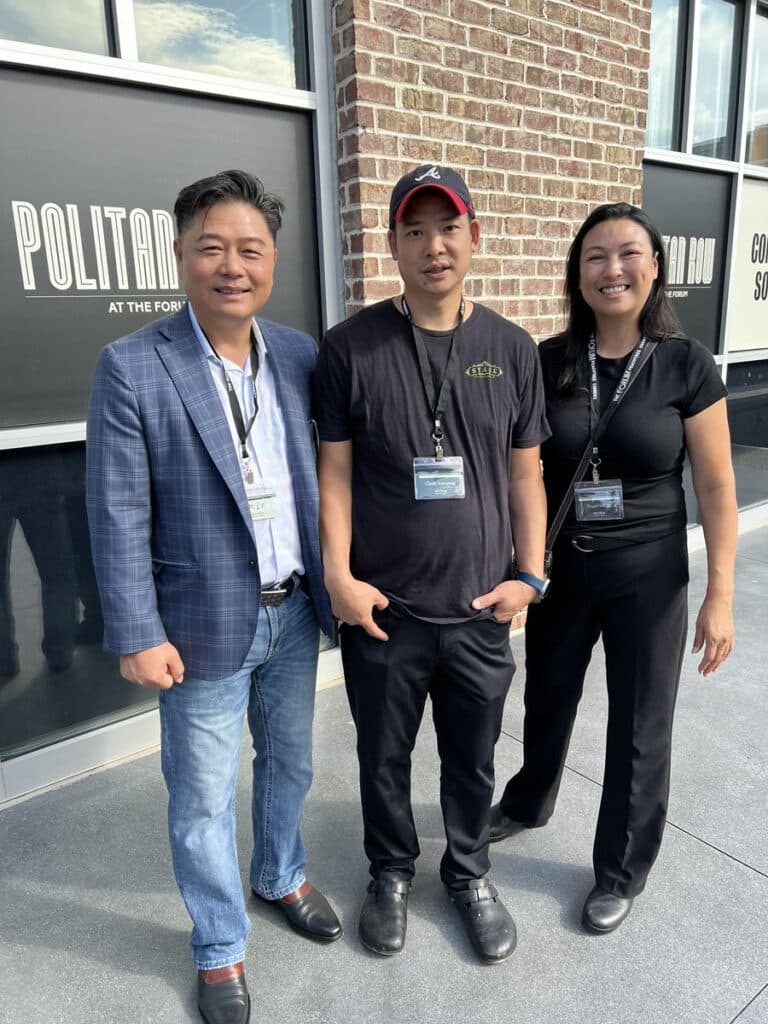
The popularity of those suburban concepts has already taken off. With Sheesh, they’re looking to do something different.
“There are going to be some things that are unique to Sheesh that you’re not going to get at the other places,” said Sunyapong. “You’re not getting a whole restaurant; this is quicker fare.”
Gekko Kitchen, a former food truck transformed into a hibachi and ramen experience, will be serving fresh, fast bowls that are more colorful and lighter than traditional hibachi fare.
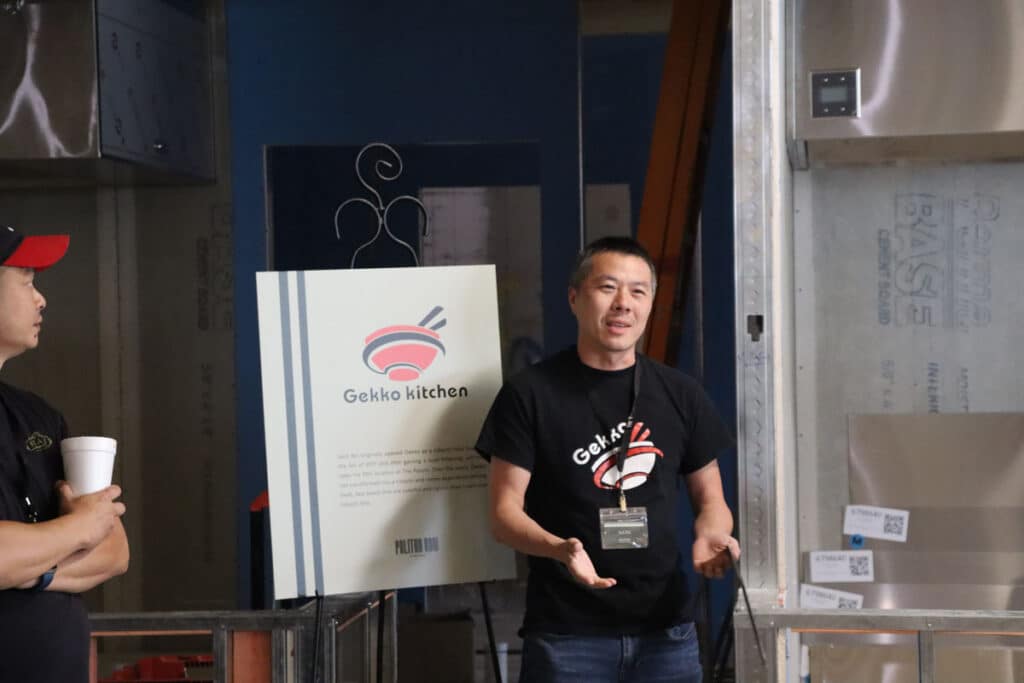
Gathering spots
Development Manager Nick Lombardo explained that NAP is moving away from building big construction projects from scratch like Colony Square in Midtown Atlanta and Avalon in Alpharetta.
“As a company, North American Properties pivoted around 2020 from building big ground-up construction to more redevelopment with already existing properties,” he said. “With the thought of great assets that just need a little more attention Infused into them to create value, we bought the Forum in 2022.”
He said that value-add propositions done at The Forum will create a more walkable center.
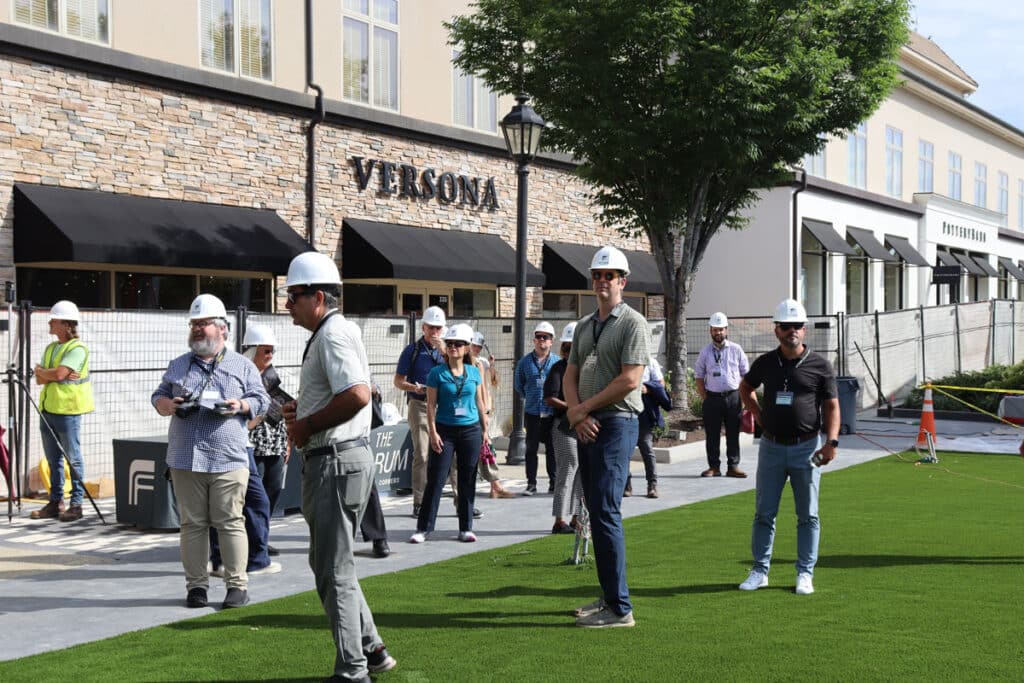
“Trying to compete with the internet on convenience is a very tough task, so the way we differentiate is by experiences,” he said. “We host between 150 to 200 events every year. We have things like concerts, wellness and fitness events and we have child playtime events. Our marketing team does a great job and they’re the differentiator when it comes to what makes our property stand out.”
By the first week of August, a large gathering space will be unveiled in the central area of the property between Pottery Barn and seafood restaurant Pêche. It will have a nine-foot LED screen capable of hosting movie nights and sports viewing. There will also be musical performances featuring local artists.
“We’re not in competition with Town Center,” said Charlotte Hinton, marketing manager at The Forum. “Town Center has gates like a real music festival and we’re more like a ‘chill and enjoy the music’ vibe where you can grab a beer and hang out or maybe kind of walk around.”
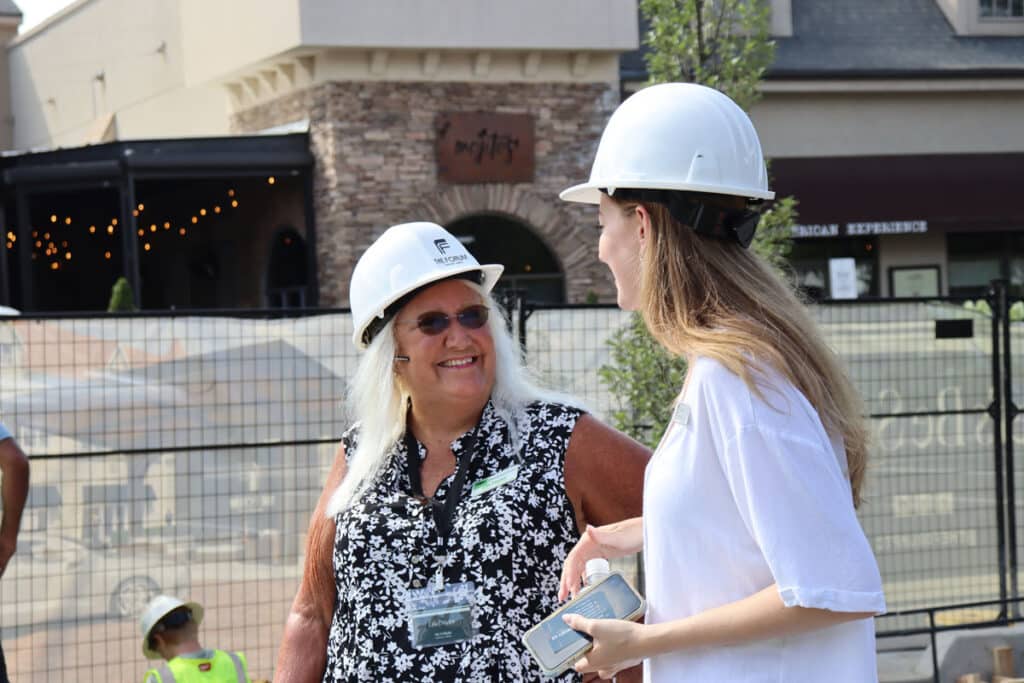
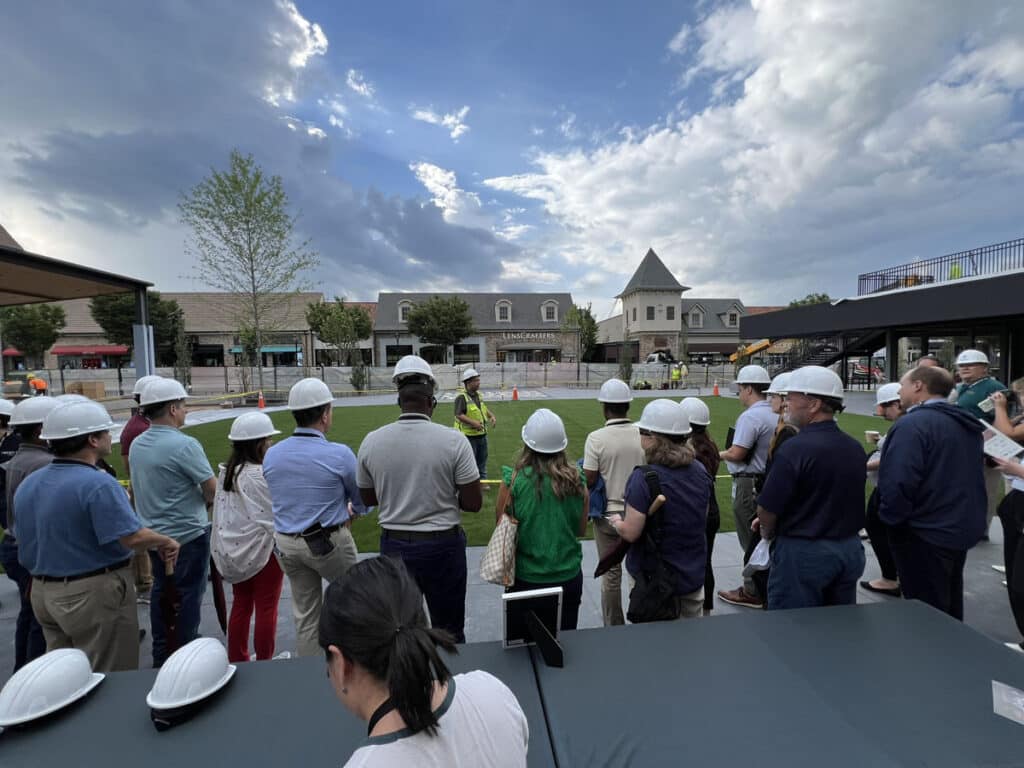
The smaller space and artificial turf are unlike the Town Center space where attendees spread blankets and bring chairs. The Forum will have furniture and seating in the space so folks can just gather and either enjoy time with family or partake in events.
The Forum will also offer valet parking on a limited schedule at that end of the property.
More improvements
Although the construction equipment will have moved out, the jewel box building will house a yet-to-be-named restaurant that will open early next year.
“We’re pretty much done with what we’re doing as far as landlord work,” said Lombardo. “We ask our tenants to bring their brand and their design and their material pallet and put that on the building to express their brand identity. They know their brand better than we do. They know how to best design their building and how it functions and works.”
It’s the same process with retail stores, he added.

“We always ask all of our new tenants to come in here when they’re building their storefront,” he said. “They’re not just selling their clothes; they’re selling a lifestyle in the brand so we ask them to push their brand out to the street.”
Even with the new spaces, there will be no shortage of parking, Lombardo added. “There’s plenty of parking behind these buildings,” he said pointing toward Pêche. “What we’ve done is enhance the connectivity to those areas. We’ve redone this breezeway and we’re adding lighting and connecting the parking lot to the main boulevard here. The goal is to replace cars with people and activity and bring a sense of community to the property.”
Related
Business
Taste of Peachtree Corners: PCBA Showcases Local Restaurants
Published
1 week agoon
July 17, 2024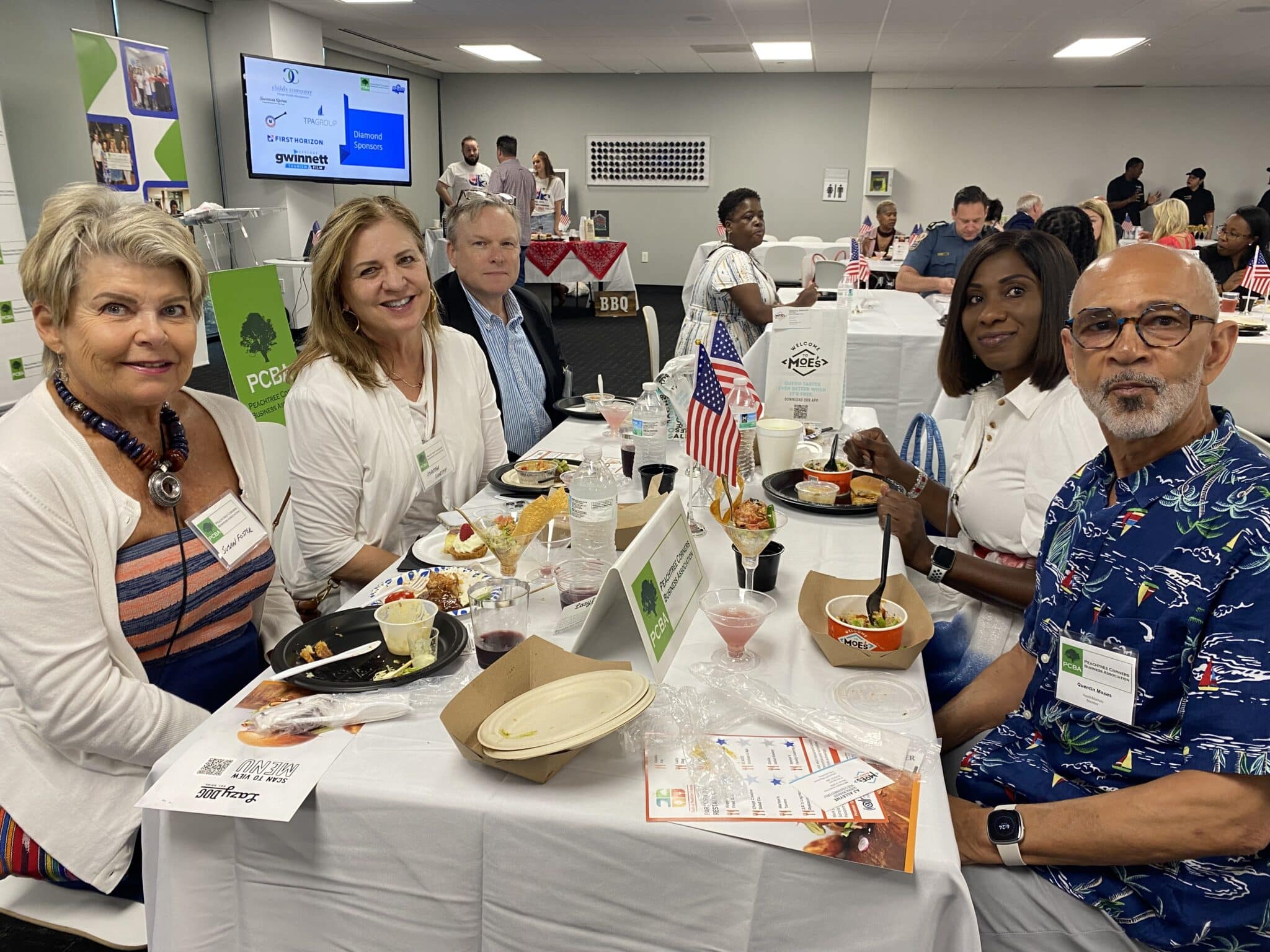
The Taste of Peachtree Corners has been in the works for years, but the COVID-19 pandemic put many key events on hold for the Peachtree Corners Business Association (PCBA).
But luckily this year, the dedicated staff of volunteers successfully executed a memorable event and introduced a lot of local business owners to their neighboring restaurants and caterers.
As I walked up to the Community Chest Room at Peachtree Corners City Hall on June 27, there was a line outside the door. I later found out that over 100 people had registered to attend the event. I got checked in quickly and was faced with a “passport” of 10 Peachtree Corners restaurants serving everything from high-end bakery items to good old-fashioned barbecue, and modern twists on seafood and American cuisines.
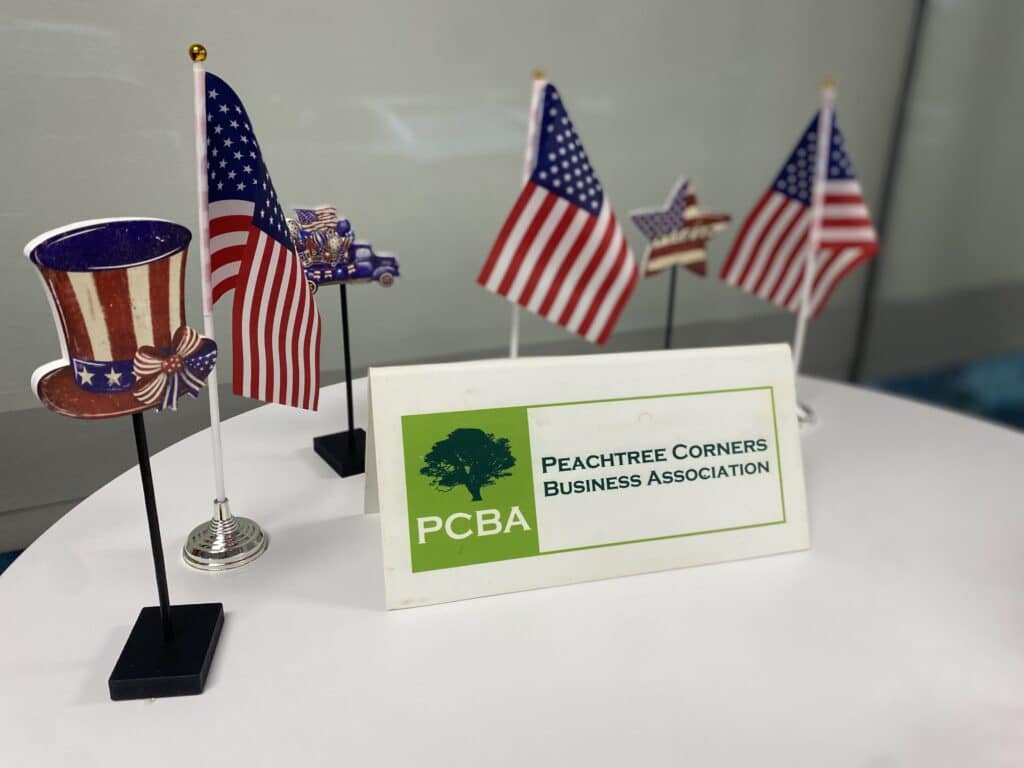
Let’s talk about the food
The idea was to visit all 10 restaurants and collect stars while trying samples and small plates. My first stop was Firebirds Wood Fired Grill, and they had my favorite – homemade chips and queso. The queso was smoky and mildly spicy with a great depth of flavor. What a great start. Next up was Chopt. Creative Salad Co. I had never heard of this restaurant before, but they blew me away with a perfect amuse-bouche of cherry tomato, pesto, mozzarella, and olive oil. These guys understand simple and fresh Mediterranean flavors.
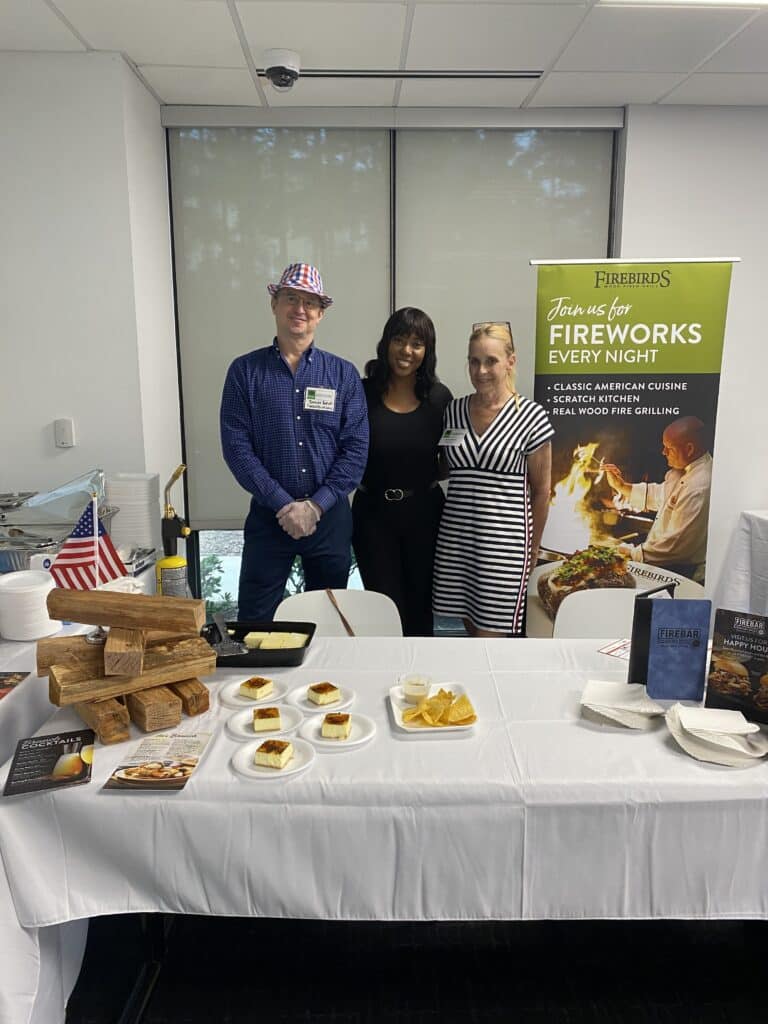
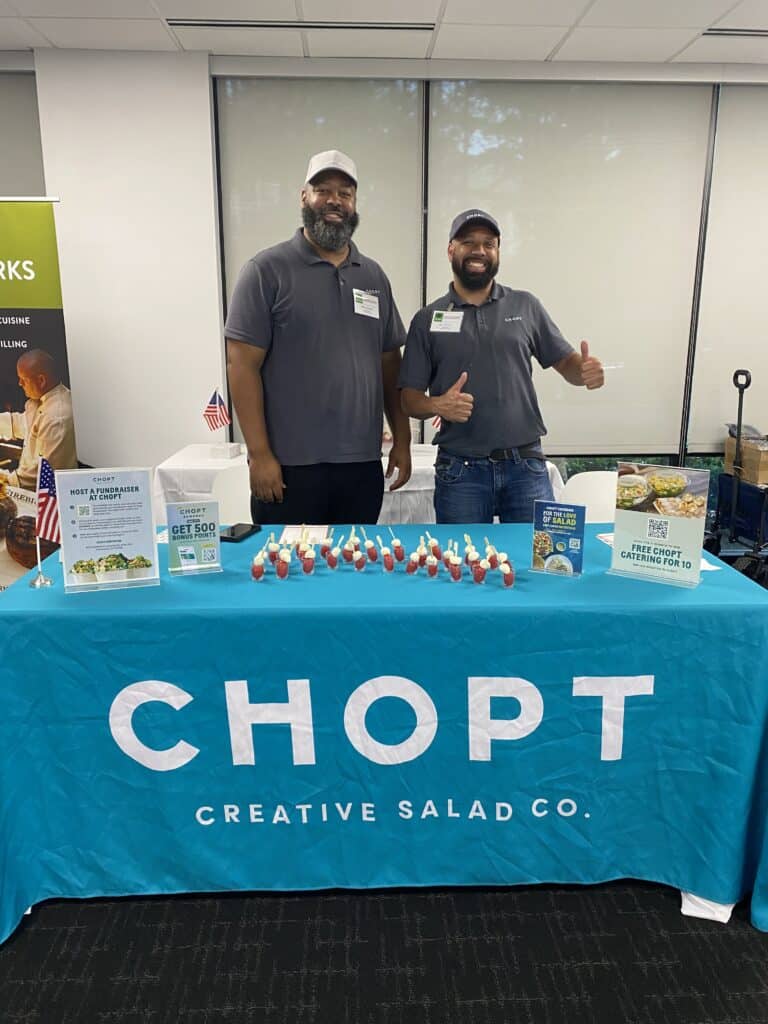

The folks from Marlow’s Tavern were also on-site serving shrimp and grits with jalapeno, spinach and tomato beurre blanc. This is definitely the style of elevated food I’ve come to expect from Marlow’s. And as a nice touch, they prepared a refreshing blueberry cocktail.
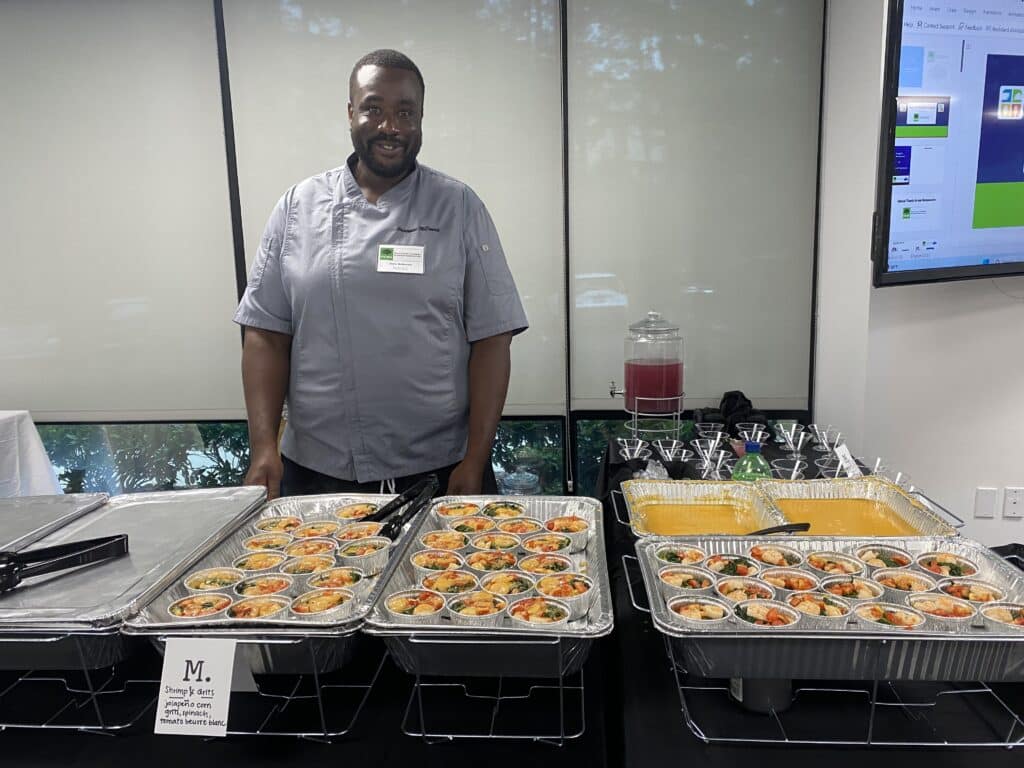

Another familiar face was set up on the other side of the room. J.R.’s Log House Restaurant served southern favorites like pulled pork sliders, baked beans and mac n’ cheese. I couldn’t pass this one up. The pulled pork was tender, tangy and saucy. Exactly what I want from a barbecue. Lazy Dog’s table really impressed me with its presentation. The tuna cup with rice, avocado and chili with chips on the side, was a real stunner.
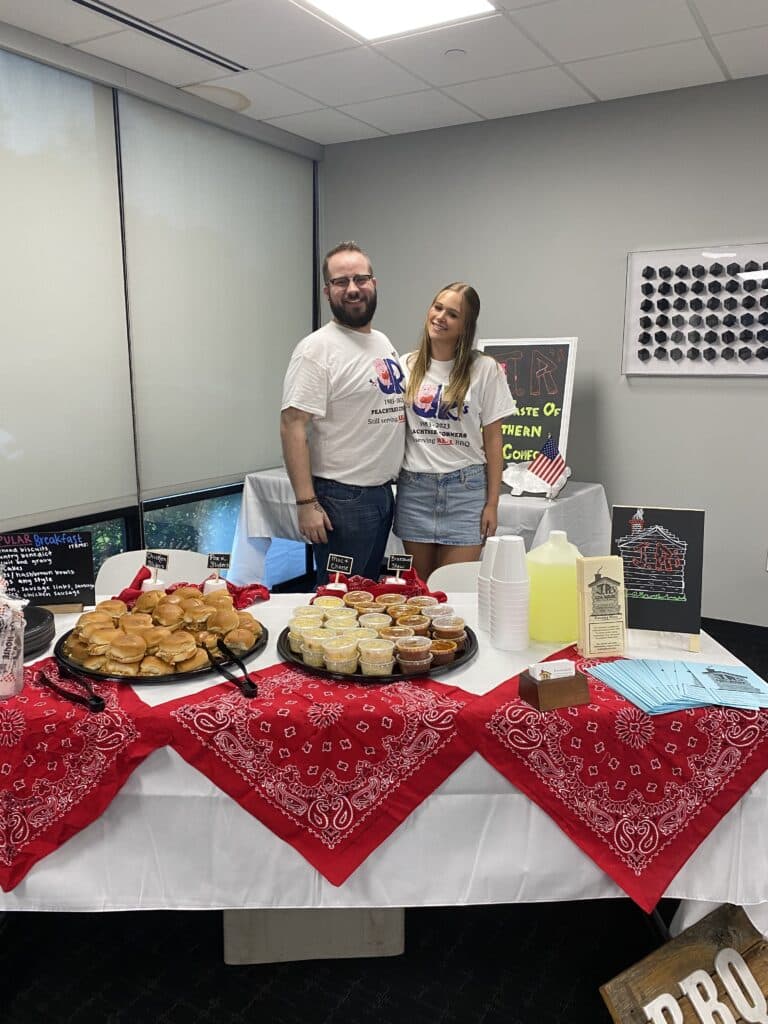
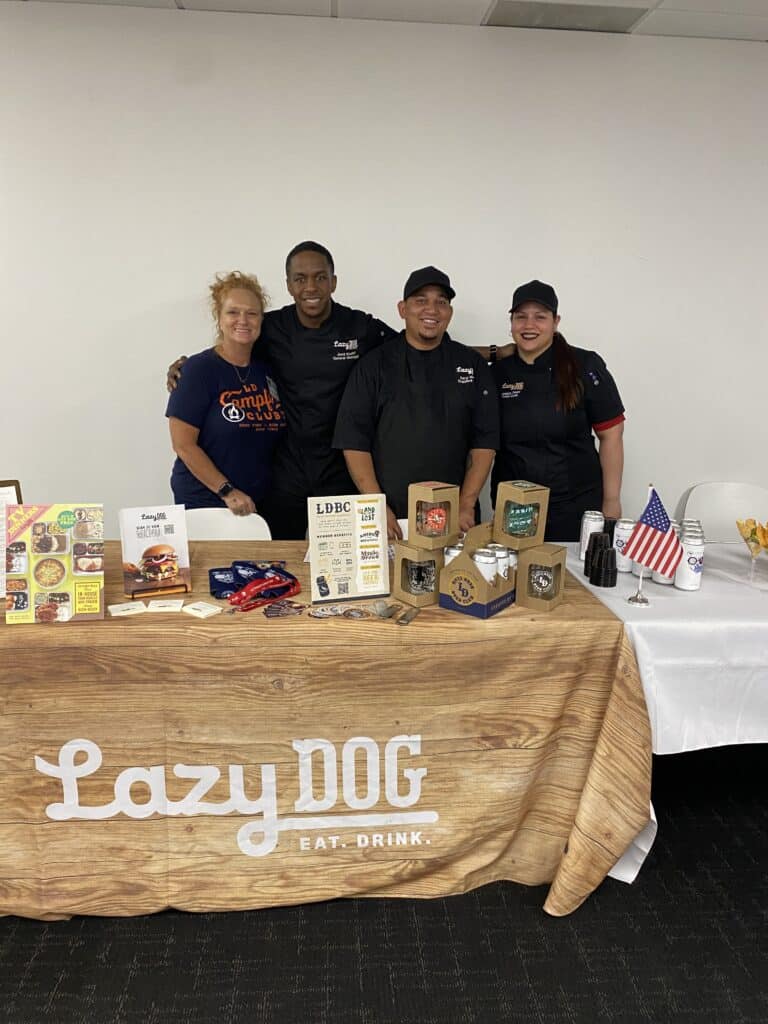
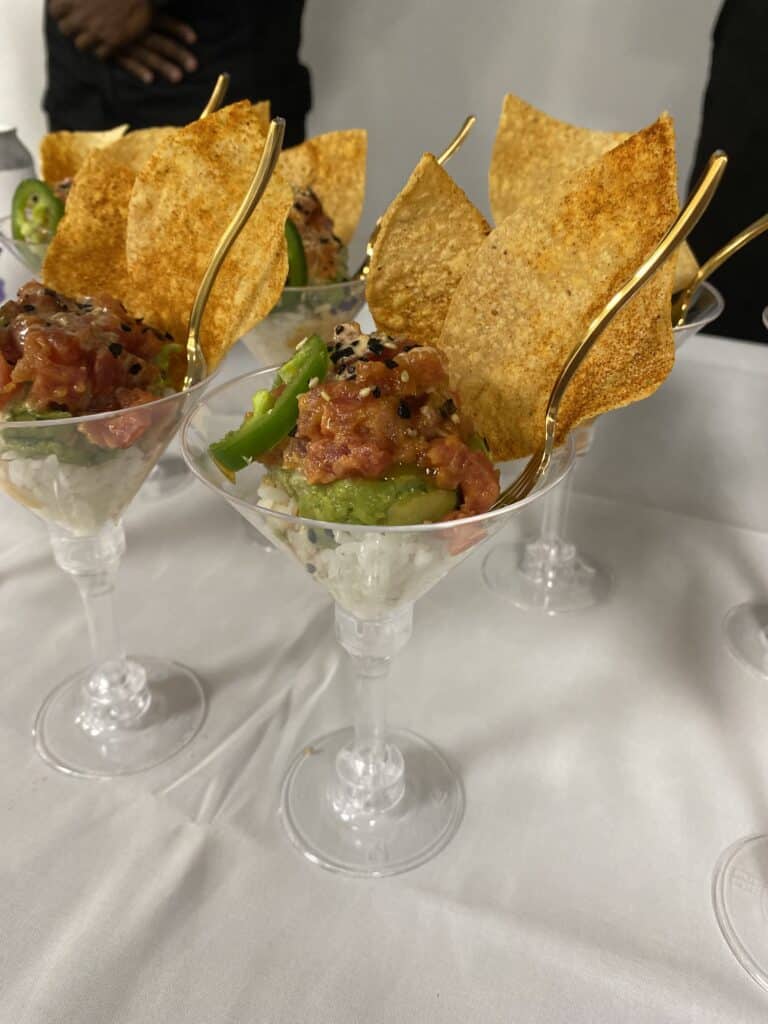
Moe’s Southwest Grill was also on-site handing out tasty tequila lime chicken with rice, avocado, and black beans. This super hearty and comforting entrée was followed by a seafood course from PECHE Modern Coastal. Crab cakes with a croissant pinwheel, roasted garlic and lemon aioli and arugula were on the menu and the flavor combinations were simply fantastic.
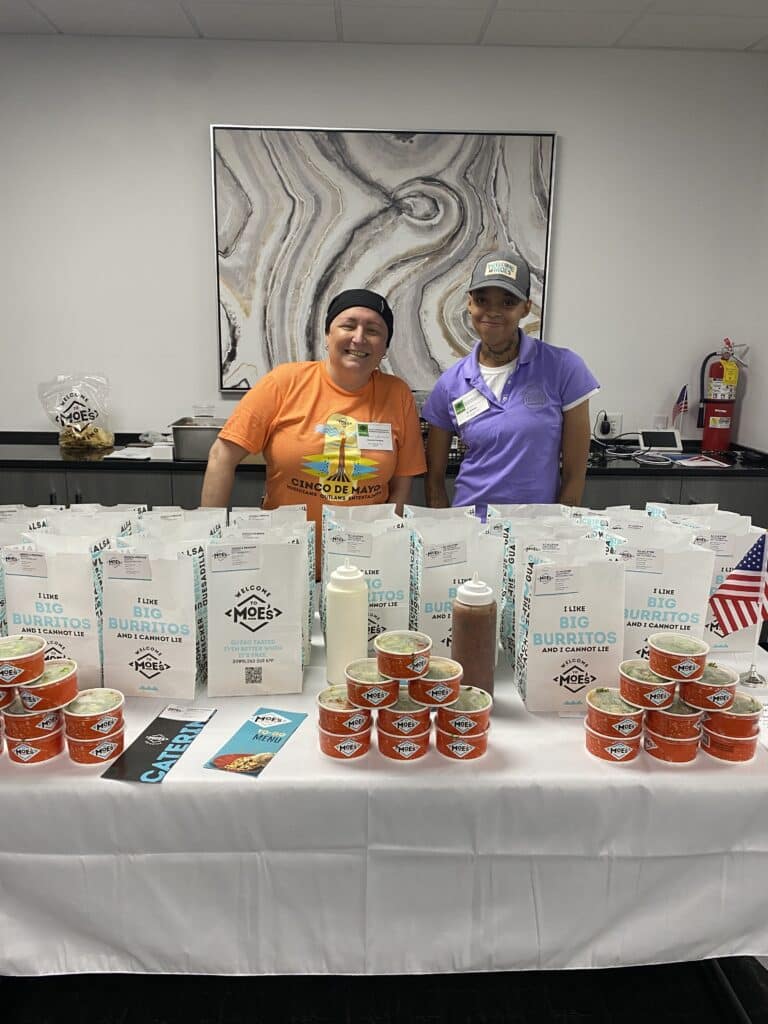
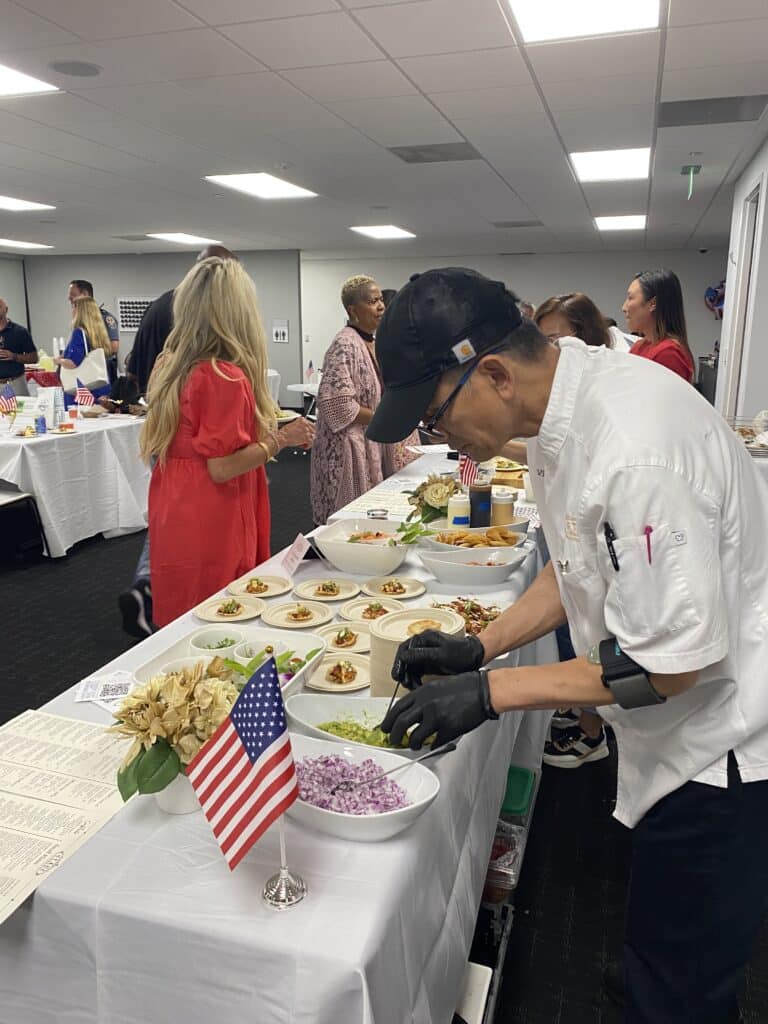
PECHE’s sister restaurant STAGE Kitchen & Bar was next door offering a tuna and salmon tostada with avocado, eel sauce, spicy mayo, and cilantro. This was easily one of my favorite bites of the night. The tostada was crunchy and light with clean and bright flavors. No kidding, I could probably eat this every day for lunch.
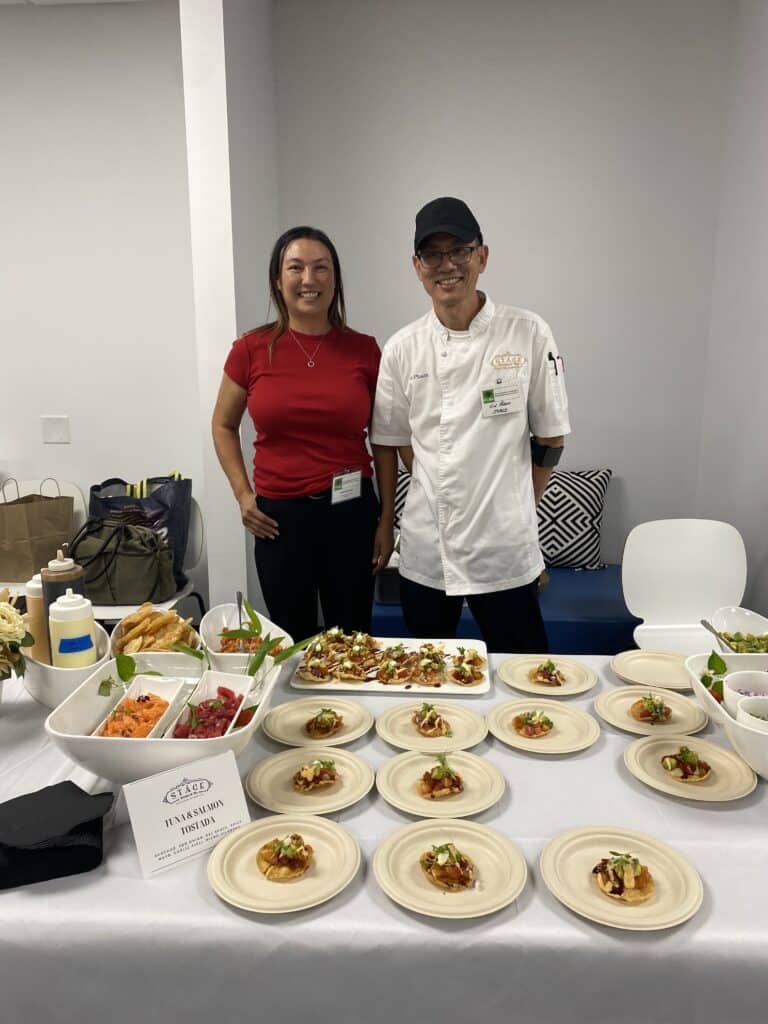

I moved on the Smoke’s Family Catering and owner Phillip Smoke had whipped up enough barbecue to feed an army. I had the pleasure of trying the smoked chicken with potato salad and it was the perfect pairing. Last but not least: dessert. I capped off the evening with a beautiful chocolate ganache-filled croissant with perfect lamination and flaky texture.
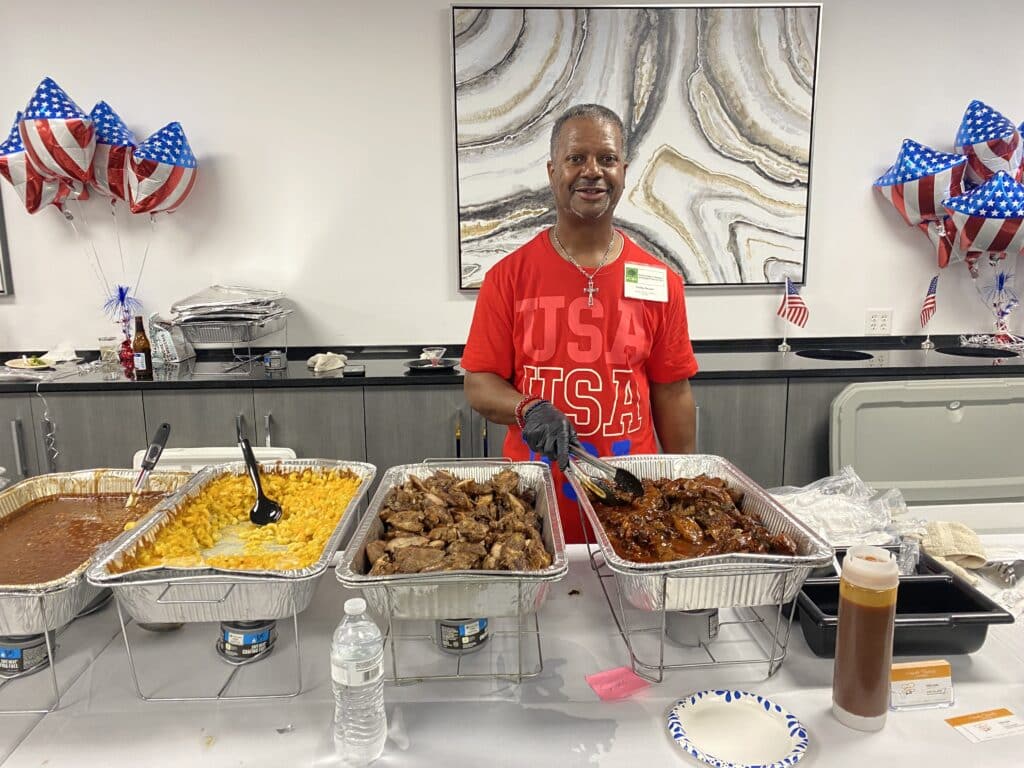
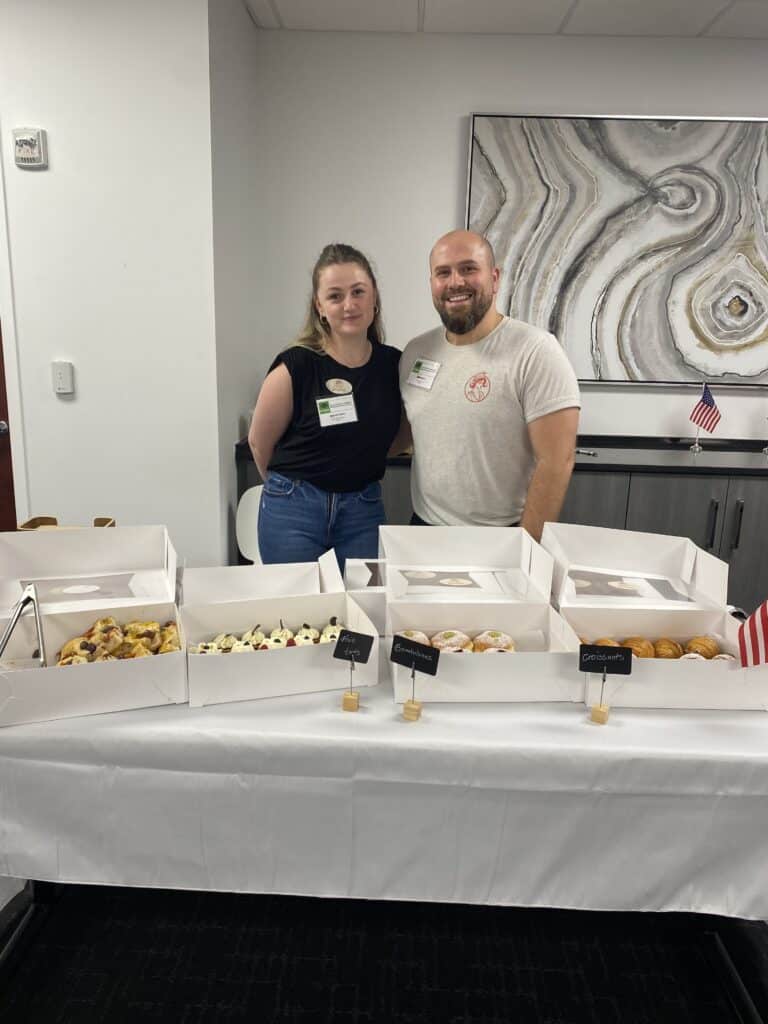

The inspiration behind the event
With a (very) full stomach, I caught up with PCBA President Lisa Proctor to talk about the event.
“We knew that COVID was really hard on a lot of our restaurants to get people back in,” said Proctor. “We wanted to do it in June because we wanted to celebrate our military. Everybody remembers them maybe on Memorial Day or different things, but June is the 80th anniversary of D-Day.”
“The military is always close to our heart,” she added. “We’re also very proud of our restaurants. They all have gone above and beyond.”
Tonight, the PCBA was honoring the Armed Forces and its brave veterans while bestowing two donation checks to very worthy causes.
The first check for $500 went to Folds of Honor. Since 2007, Folds of Honor has provided life-changing scholarships to the spouses and children of America’s fallen or disabled military. And now, their mission expands to the families of America’s first responders.
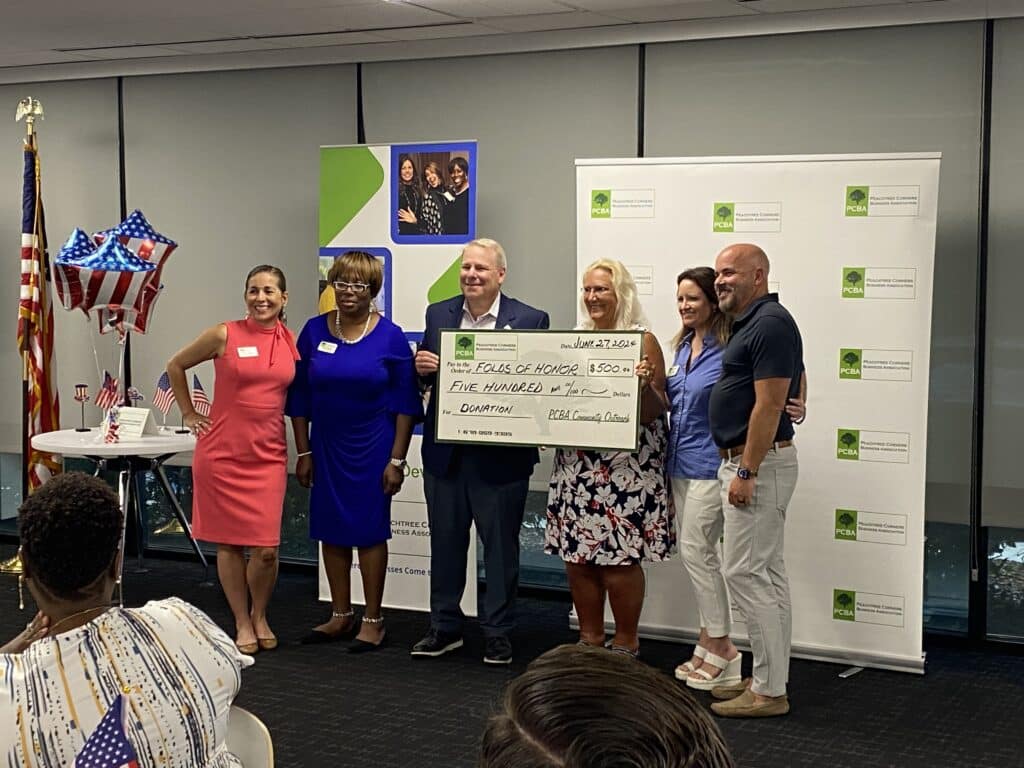
The second check for $500 was given to Light Up the Corners, a 501(c)(3) volunteer organization with an annual glowing, flashing, blinking, shining, nighttime running party and fundraiser in one. All proceeds from the event go to benefit less fortunate children and families in the Peachtree Corners community who are struggling by giving them the chance to participate in life-enhancing programs and activities at the Fowler YMCA.

Over the past 12 years, the PCBA has awarded 19 scholarships and donated more than $156,000+ back to the Peachtree Corners community.
Related
Business
Local Resident Opens AtWork Location in Peachtree Corners
Published
2 weeks agoon
July 10, 2024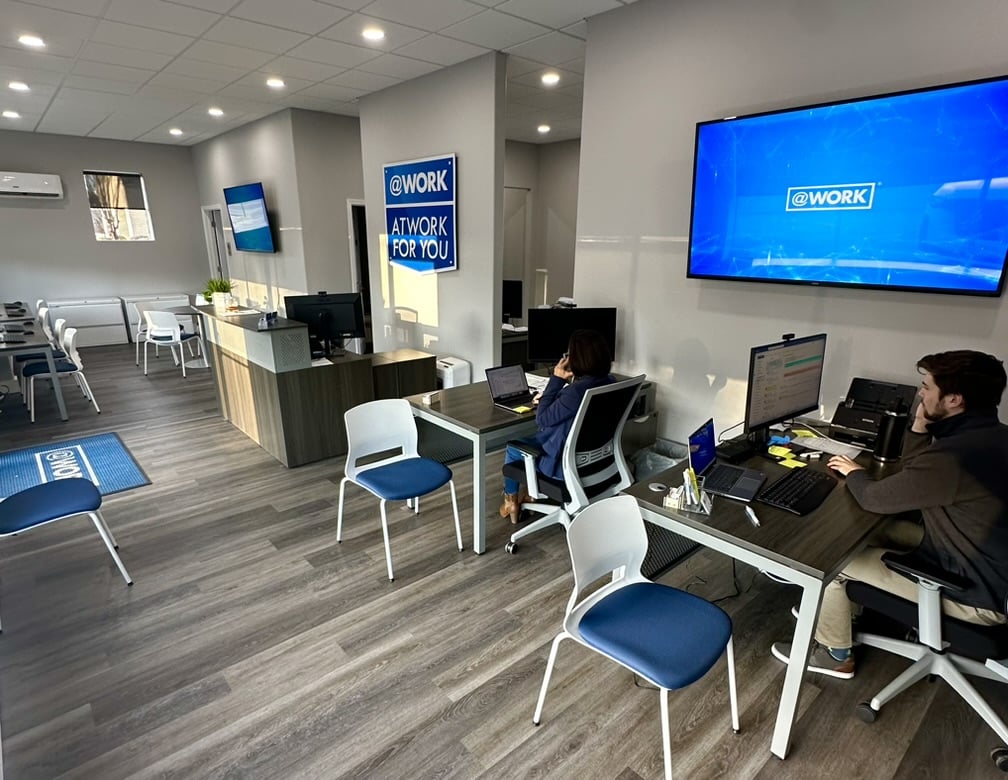
AtWork, one of nation’s leading staffing franchises, has opened its third Metro Atlanta location in Peachtree Corners, Georgia at 6185 Buford Highway, Suite E-100.
AtWork Peachtree Corners is locally-owned by Kamal Bhatia, an immigrant from India with decades of experience in hospitality and as the Senior Vice President of Operations of Atlanta-based Action Bartending School.
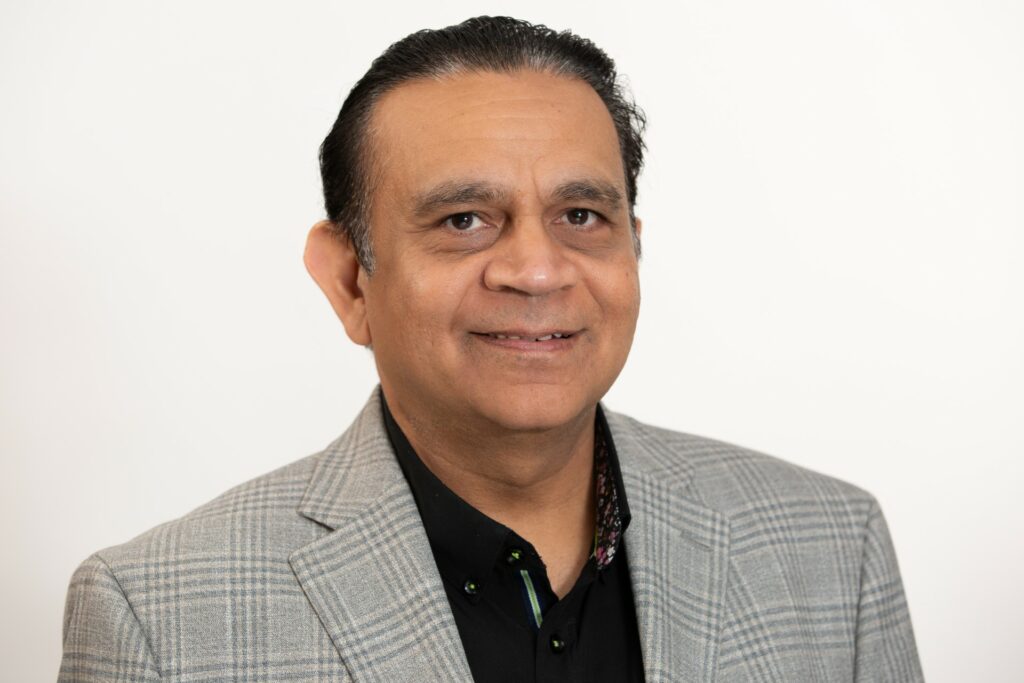
“There is an incredible need for AtWork’s services in Peachtree Corners,” said Bhatia. “Since migrating here in 1996, I’ve witnessed Atlanta evolve and sprout new communities north of the city, including my own. Peachtree Corners has become a hub for thriving businesses, and my goal with this location is to be a key resource between companies and job seekers to support the continued growth of our local economy.”
Bhatia’s son and daughter will assist him in the business.
“This is an opportunity to create a legacy company to ensure our community is supported for generations to come,” he said.
For more than three decades, AtWork’s mission has been to connect people with jobs and jobs with people. With more than 100 locations nationwide, AtWork puts nearly 40,000 individuals to work each year in administrative, light-industrial, accounting and finance, hospitality, IT and management-level positions at some of the nation’s largest and most recognizable companies.
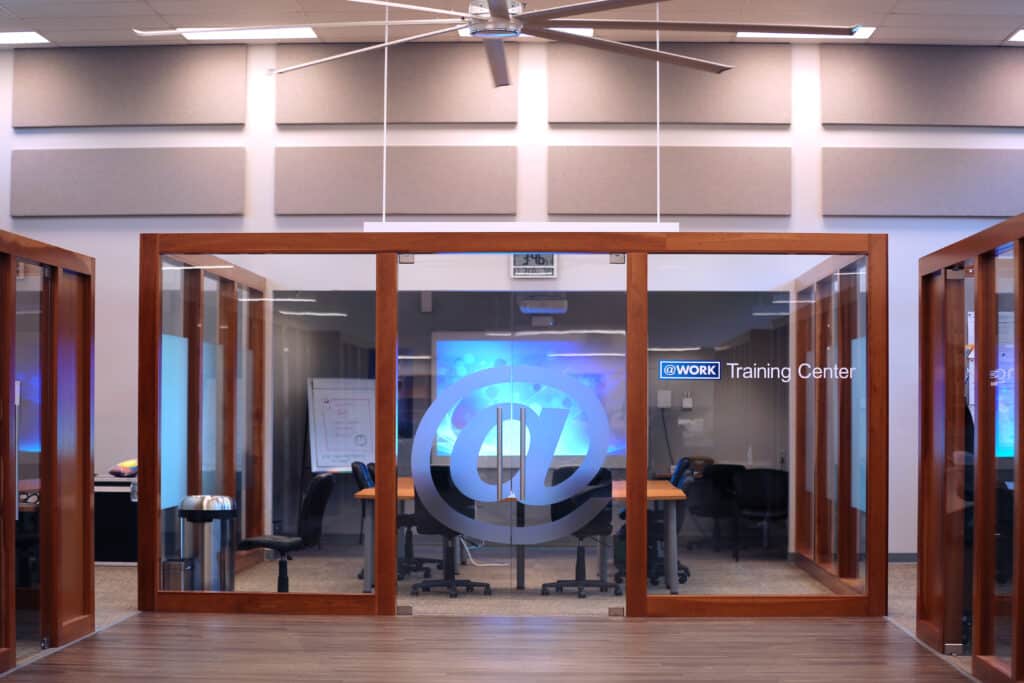
“We’re proud to open our doors in Peachtree Corners and provide a common place for both job seekers and growing businesses to turn for staffing solutions,” said Jason Leverant, President and COO of AtWork.
“AtWork will serve as a key resource to help employees thrive, businesses prosper and communities flourish. Kamal is the perfect partner to champion our mission and be a servant leader in her local community,” he added.
Related
Read the Digital Edition
Subscribe
Keep Up With Peachtree Corners News
Join our mailing list to receive the latest news and updates from our team.
You have Successfully Subscribed!

Taste of Peachtree Corners: PCBA Showcases Local Restaurants

What’s going on at Jones Bridge Park and the Challenges of Urban Development

The Forum Gives Sneak Peek of New Eateries and Community Spaces

Southwest Gwinnett Mayors Share Visions for the Future

Peachtree Corners Shines Bright with Light Up the Corners Glow Race this August

8 Events Happening In and Around Peachtree Corners This August

Peachtree Corners Shines Bright with Light Up the Corners Glow Race this August

The Forum Gives Sneak Peek of New Eateries and Community Spaces

8 Events Happening In and Around Peachtree Corners This August

Southwest Gwinnett Mayors Share Visions for the Future

Taste of Peachtree Corners: PCBA Showcases Local Restaurants

What’s going on at Jones Bridge Park and the Challenges of Urban Development

Local Resident Opens AtWork Location in Peachtree Corners

CHRIS 180 Expands its Services into Gwinnett County [Podcast]

Light up the Corners [Video]

Capitalist Sage: Business Leadership in Your Community [Podcast]

Cliff Bramble: A Culinary Adventure through Italy

Top 10 Brunch Places in Gwinnett County

A Hunger for Hospitality

THE CORNERS EPISODE 3 – BLAXICAN PART 1

Top 10 Indoor Things To Do This Winter

The ED Hour: What it takes to Remove Barriers from Education
Peachtree Corners Life
Topics and Categories
Trending
-
Business1 week ago
Taste of Peachtree Corners: PCBA Showcases Local Restaurants
-
Business2 days ago
The Forum Gives Sneak Peek of New Eateries and Community Spaces
-
City Government4 days ago
Southwest Gwinnett Mayors Share Visions for the Future
-
Community2 days ago
Peachtree Corners Shines Bright with Light Up the Corners Glow Race this August







